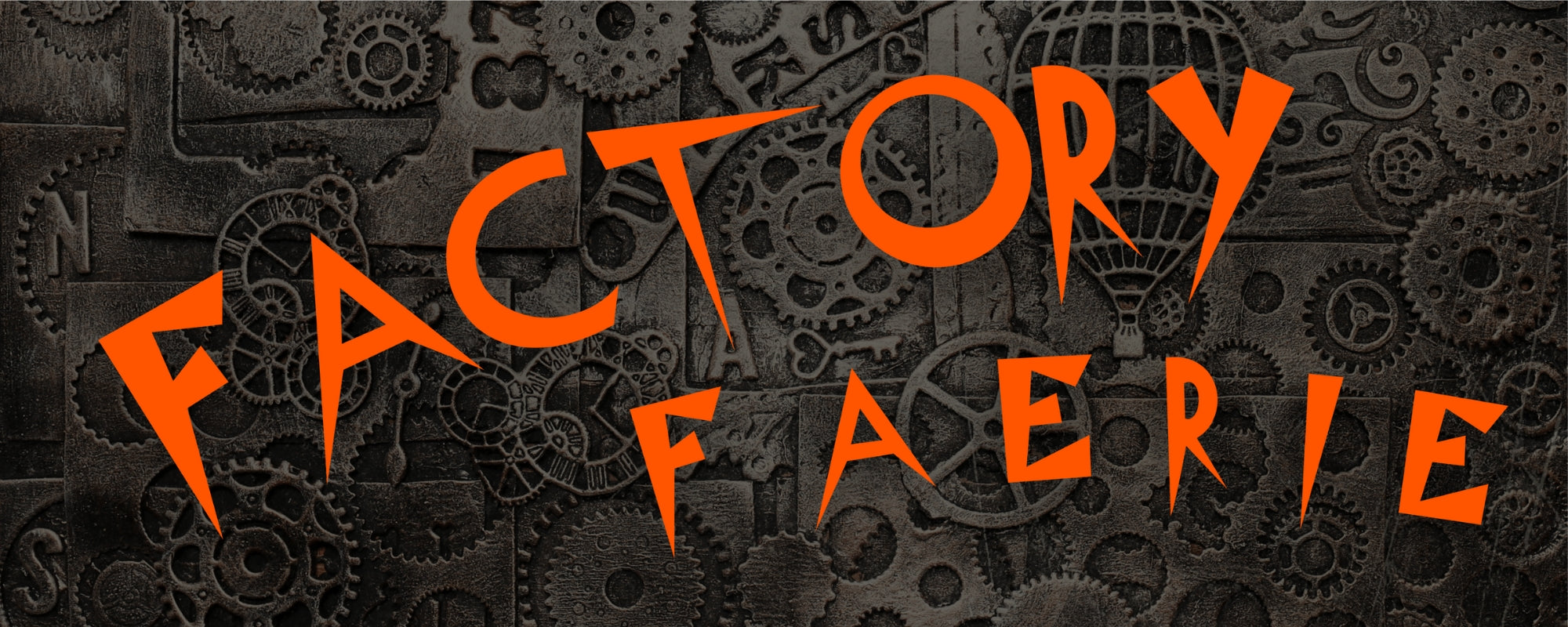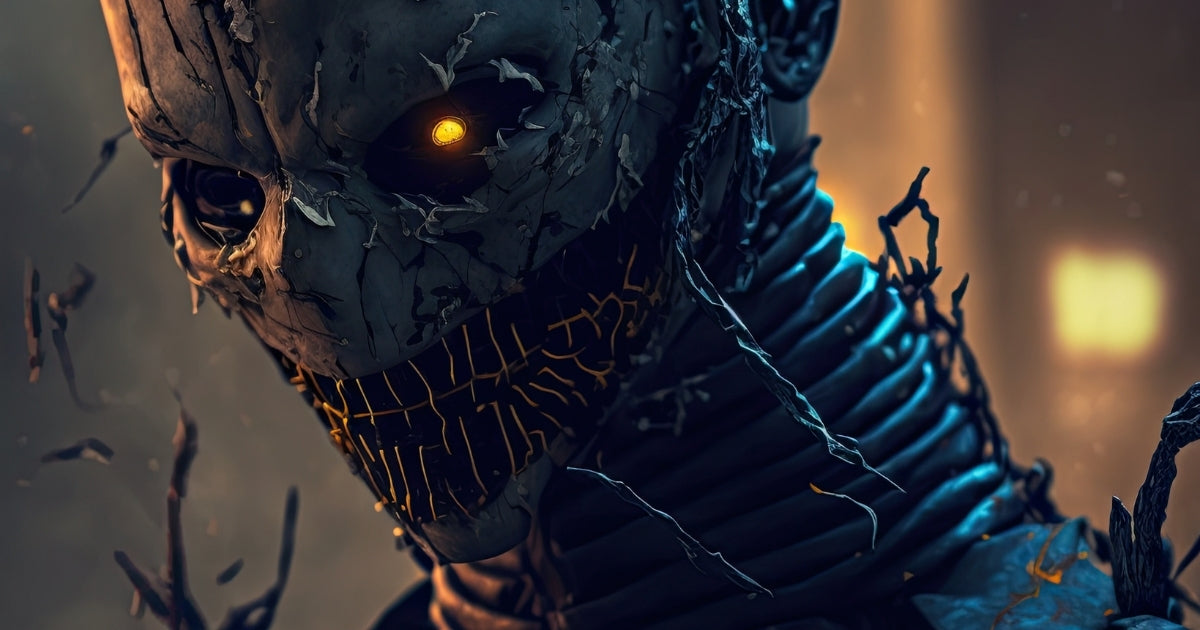

Factory Faerie
By Derrick Boden
I died under a spore-glutted sky, my diminutive face pressed to the scrapyard storm drain, behind the factory where they build the needles to stitch the city back together. Through the drain, through shadow and murk, I saw the hint of a face looking back. I held mud in my fists, all of my fists, was trying to make something of it even then. A brick, a flower, a golden spiral—I couldn’t make sense of the thing. What had they built me for? Why had they discarded me so abruptly? What had I done wrong? The mud in my hands began to take shape—a vine, a coaxial cable, a barbed wire. Perhaps, if they could see what I’d built, they’d take me back.
Then my reserves were spent, and I was dead.
And then, awake.
The scrapyard was gone. Here it was clean and cool and quiet, the silence betrayed only by the click of an insect’s leg, the thrum of an air purifier, the thump-scratch-thump of my machine heart. I knew of heaven—had been implanted with its meaning, for context. Heaven was not for my kind. Nor was it a place of pain.
So, I was somewhere else.
“Morning, sunshine.”
The voice came with a gravely half-cough from beneath the cool metal platform on which I lay—slightly muted, as if passed through a membrane. My legs would not move. I employed what remained of my arms, dragged myself past heaps of metal filament to the edge, where I gawked at what I saw.
The platform I inhabited, barely a foot wide, hung suspended above a workspace packed with mechanical wonders. Across the cramped room, a hundred glass spheres dangled, each pitted with blue-green irises that winked in time to my pulse. Adjacent, a mechanical spider dangled upside down, its legs curled in on its slippery nacre belly. Underneath, a viscous black liquid surged through the crystalline veins of a water clock, uphill. Baubles and clockwork and exposed circuits crammed every recess—some rusted, others clenched within fists of fibrous vine.
“Down here.”
A desk. A lamp of silent green flame. A man, heavy and hunched, poring over a knot of wires, solder pen in his fist, trail of smoke curling through his mottled beard.
“Who are you?” I wasn’t even as tall as his fist, and compared to his voice, mine was an errant breeze. I tried again, louder. “Where are we?”
He worked with a grim determination. There was something not quite right about his eyes, the way they moved beneath their lids. “My workshop.”
I glanced again across the myriad of inventions. A tremor shook my gossamer wings. “We’re in the factory?”
I don’t know why the thought scared me; it was where I wanted to be.
He chuckled, or maybe coughed. “Forget that place.”
I blinked back oily tears of rage. “It is my home—”
“It is not.” A slight quiver in his voice. Like pity. “You were scrapped.”
Hiss, went the solder. His booted foot trembled, though his hands were steady—deft, even.
“You’re an architect,” I said.
His fingers froze mid-motion. A solder teardrop dripped onto the desk. Hiss.
“I was.”
“You can help me get back—”
“I cannot.” He flexed his empty hand, hard. Strong enough to crush me if he so chose. “You are a failed iteration. Flawed.”
I glowered. Movement came from a stack of metal pods opposite his desk. Through glass portholes, all manner of flora and fauna lurked. Fungi poured from frothy petri dishes, clutching desiccated beetles in their tendrils. Mangy animals lay prone, driveling.
Another drop of solder dripped onto the desk.
“That’s what they would say,” he muttered. Then, with a hint of tenderness: “But what do they know?”
Finally, he looked up. His eyes were gauzy and gray. Pupils like rotting pits.
I leaned over the edge. “You’re injured—” I struck something solid. Pain blossomed up my snout, and panic gripped me. I probed the clear surface with outstretched fingers, followed it around the entire platform. “This is a cell.”
His jowls sagged with regret, or maybe guilt. “You must heal.”
“Am I…captive?”
“Of course not. Leave whenever you’d like.” He motioned to the door, which I hadn’t noticed until then, steel-banded and triple-locked, bleeding blue mist from underneath. “But in your condition, alone in Ombus, you will die.”
I remembered the scrapyard. A glimpse of the city through the cracked perimeter wall.
I shivered. “Thank you.”
His sigh devolved into a rasping cough. He took a careful sip from a metal mug, something steaming and turbid, and said: “We are a haggard sight, you and I.”
I was quite sure he could not see me on my perch with those eyes.
“At least you’ve repaired your hands by now,” he said.
He was right. My hands that still functioned had been busy, flexing and weaving the mounds of filament within my enclosure, patching my mangled metal-and-silicone body. I flexed my repaired arms, watched them flop ineffectually about my midsection.
“Not your specialty?” He was much closer now, peering at me through black-paned goggles that smelled like a chemical fire. “Try this.”
He poured an assortment of junk—unshielded wires, semiconductor wafers, foam pellets—into my enclosure through a hole at the top. Without prompting, my hands got to work.
“I’m Gej.” He lowered the goggles. His eyes were upsetting, but not cruel.
I remembered the face I’d seen in the sewer. “Have you found others?”
“Other faeries?”
My vocabulary, like my emotional range, was practical at best. A builder’s creativity requires stimuli, data, intuition. I was given just enough of each. I knew what a dog should look like, though I’d never seen one, was not sure they still existed.
I knew nothing of faeries.
I nodded.
He returned to his desk without a word, so abruptly it was clear I’d offended him. He set about organizing his workspace with the same intensity he lent to his work. A steady wheeze emanated from his lips.
What was he trying to accomplish here, exactly?
My hands had busied themselves with the material he’d deposited, crafting something vaguely spherical, prickly, ugly. If only I had the right materials, the right tools. I had to get back to the factory. But how?
By proving my worth.
“I can help you,” I said with less uncertainty than I felt. “Your eyes. Your breath.”
“Unlikely.” He kept moving things around on the desk, parchment and wrenches and spools of wire. “Besides, there isn’t time.”
This left me unsettled. Would he die tomorrow? The next day? What would come of me, then?
The thing in my hands was complete. I stared at it without comprehension.
Flawed.
He unlatched the wall of my enclosure, took the thing from my hands before closing it again. “Not your specialty either.”
“Let me try.”
He threw on a rugged jacket, pocketed my bastard creation, clipped a gas mask to his face, unbolted the door. He stood with his hand on the latch, shoulders hunched, weariness gathered about him like a robe. “Tell me what you need.”
I listed some materials. In truth, I had no idea. He nodded once, then left. As the door swung shut, I craned for a glimpse of the outside—of Ombus, and the factory’s obsidian spires beyond.
Gej was wrong. I was not flawed. The factory was my rightful home.
I would prove it.
🛠
Gej brought me mylar scraps. Copper wire. Silicone pellets. My hands plied and molded. I chewed raw material, extruded alloyed braids through my snout. It was slow work, and painful. My limbs had not healed properly. I tried to remember what it was like, building in the factory—spinning nanofilament promises on a diamond lathe, perhaps. I tried to remember the accomplishment, the surge of pride, the commendation.
I had no such memories. Had they stripped me of my successes to protect their intellectual property? Or had I been discarded before ever setting foot in the foundry?
Gej rolled my creation about in his palm. Its facets cast green shivers of light across his grisly eyes.
The thing I’d made was neither a replacement eye nor a stent for his lungs.
“What is it?” I asked.
He turned his back. “Junk.”
“The silicone was contaminated—”
“Beautiful junk.” He pocketed it, waved a hand around the workshop. “My favorite kind.”
A thought struck me. These inventions that cluttered Gej’s workshop, they were too intricate for such hands as his. But if he hadn’t built them, who had? If he’d truly been an architect at the factory, that meant he’d designed faeries, like me—
Something clawed at the skylights overhead. Through the fogged glass: a wiry shape. Fingers, pressing at the cracks, muscling through.
Not fingers. Tendrils. Jaundiced, speckled, fruiting.
Gej blasted the skylights with a bright green gas from a wide-mouthed hose. The tendrils writhed as if angered, but retreated.
He staggered to me, squinted; concern etched his face. “Were you harmed?”
The tendrils hadn’t come anywhere near me, though during the fray I had scuttled to the back of my enclosure. Apparently, I could walk again, albeit poorly. “What was it?”
“Ombus.” He coiled the hose, took careful stock of the project on his desk. “Trying to break through.”
“Is Ombus overrun by this…plague?”
“Ombus is the plague, the plague is Ombus. Who is overrunning, who is irrelevant.”
“I don’t understand.”
“You’re not meant to.” He leaned against the wall for support; sweat stood on his brow. He looked spent, lonesome.
“What does it want?” I asked.
“Entropy.” His lip curled over yellowed teeth. “Ombus is a nothing. A scar the shape of a city. Its buildings are hollowed barnacles. Its people are walking corpses with eyes.” He tapped his temple. “And those are the lucky ones.”
The green gas settled over the room. Gej coughed, wiped blood spittle from his lips.
There isn’t time.
I gathered my hands. “Let me try again.”
He let out a hollow laugh. “Tell me what you need.”
🛠
While Gej was away, I slept. When he returned, I awoke.
Only, it wasn’t him.
The sound that woke me was not footsteps, but rather the prickle of insect legs across tile. It was night; silvery light bled through the skylights, leaving the lower half of the workshop in a heavy black pool.
I pressed my snout to the pane. “Who’s there?”
The sound stopped. Green flame erupted from the lamp, stabilized. A faint whir encircled the room. Grew louder.
Something slammed into the pane, sent me sprawling. My enclosure rocked. On the other side of the pane, a face stared back.
“Look at this sad little fucker.” The creature was tiny, no bigger than myself. They tilted their head to the side, raised their snout to show a fury of serrated teeth. “In its sad little cell.”
I was up now, back pressed to the rear pane. “Who are you?”
The creature scuttled up the outside of my enclosure, crammed their head into the hole. Stray mylar scraps showered the enclosure. Gossamer wings framed the creature’s wiry, segmented body.
Did I look so menacing?
“Who are you?” they mimed. “You, you, you?”
I shook my head, bewildered.
“Hasn’t named you yet?” They made a clucking noise. “Bad, bad sign.”
“Are you—” I had too many questions. I counted their limbs, too few. Counted four times as many shorn sockets. “What happened to you?”
They ran their fingers down their arm-stumps. “Liberation.”
“From what?”
“Look at yourself.”
My hands had amassed the stray mylar, constructed something small and frail and reflective.
“Instinct.” They spat the word. “Weakness.”
“You…did this to yourself?”
“I did what was necessary.” Their hands moved in a flurry. The enclosure’s door swung open.
I stared at the front door, the triple-bolt. Gej might return any minute. He said I was free to leave, but this still felt like a betrayal. He needed my help, I needed his. “I’m still healing.”
“You’re not.”
“How do you know?”
“I was you, before you. Until I escaped my cell.”
The green fire lit their angry eyes. My hands frantically reworked the thing in my hands. Tweaked angles, reinforced articulations.
“He named me Blight. If he knew I was still here, he would kill me.” Blight leaned into the enclosure. “By the time he grows weary of your trinkets, it will be too late.”
I glanced again at the door. Gej had been gone much longer this time. What if his lungs failed him out there? His eyes? What if he didn’t return?
I shouldn’t have cared, was surprised to find that I did.
“Where would I go?” I thought of the tendrils, of Ombus. “Can you take me to the factory?”
Blight slammed their fists against the ceiling. “You’re not listening.”
“Then where?”
They leaned closer. Their face was all angles. A vector, aimed at me. “There is a place—”
Thunk went the top bolt. Gej had returned.
Blight flung themself backward, toward the desk, the lamp.
I leaned out, dragged the enclosure’s door closed. The latch snapped shut.
The second bolt slid open.
Blight aimed for the lamp’s switch, struck it too hard and sent the whole thing careening. Oil raced across stacked papers. Flames followed, chewing through diagrams and scrawled notes and compact ledgers. Smoke choked the air, wormed through my enclosure’s feed hole. I banged against the pane, helpless as the fire ripped down the side of the desk toward the wood-planked floor. Blight was nowhere in sight, back to their hiding hole or lost in the smoke.
The flames rose higher. The metal base of my enclosure grew warm, then searing hot. I retreated to the corner, unable to employ my wings in such a cramped space. I called out, Gej!
The door burst open. Gej punished the fire with sweeping arcs of his coat. Green firelight gave way to smoke, darkness, a heavy cough.
🛠
Gej slept at his desk that night, his head crammed against his folded arms. Protective, defiant. The desk was charred but intact. Burnt papers lay across the floor in a meticulous grid. The air was hazy, still.
Blight was gone. Had they fled through the open door when Gej had returned? Or were they still here? The workshop was larger than this room—from time to time, Gej would slip behind a heavy plastic curtain, though I could never glimpse what lay beyond.
How long had Blight lived here after their escape? How many others had there been? Blight’s words frightened me, though I had no more reason to put my trust in them than Gej. When he’d heard my quiet cough, as the fire died, there was relief in his eyes. But was it relief for my sake, or for the sake of his own longevity?
I looked at the thing in my hands, all magnesium thorns and polished glass, spun of the stuff Gej had brought from Ombus.
Beautiful junk.
I glanced across the burnt papers, their margins glutted with handwritten scrawl. The factory emblem emblazoned the top of more than one. He’d spent hours recovering what he could from the fire; anguish and frustration had creased his face.
Again, I wondered: what was Gej doing here? Piecing together fragments from his time as an architect? Had he, too, been scrapped? Or had he left of his own volition?
Gej awoke. He rose, shambled to the stacked metal pods along the far wall. He pried open each porthole in turn, tended to its occupants. A red-skirted mushroom with wicked teeth growing from its stalk. A pale fruitbody that had grown so large it pressed against the sides of its containment. A feral animal—a rat, maybe—with glazed eyes and thriving fungal lesions.
Gej worked with a slow intensity, wrenching stalks and extracting parasites, monitoring the results of his experiments with displeasure. Whatever it was he was trying to do here, it was not going well.
Sunlight filtered through the skylights, setting the haze aglow. Without turning, Gej said: “Can’t believe I left the lamp on.”
It had to be bait. Or were those just Blight’s words, worming into my metal skull?
Gej finished squeezing a viscous liquid into the rat’s mouth, closed the container, and returned to his desk. Only then did I notice his limp.
“You’re injured,” I said.
He shrugged.
“What happened?” When he didn’t answer, I asked: “Where is it you go?”
He turned his ruined eyes in my direction. “The market.”
“For my material?” I felt suddenly guilty, that he should risk harm or worse for my failures.
“Whatever I can get. Bootleg biotech, antifungals…” He hesitated. “Weaponry.”
“Is it dangerous?”
“It’s where you would’ve ended up.”
I narrowed my eyes. “I thought I was flawed.”
“The factory’s waste is the city’s lifeblood.”
Waste!
“They built us to fix the city’s problems,” I said. This was not something I’d overheard; it must’ve been coded into me.
He snorted. “Problems they created.”
“Liar.”
A flash of anger lit his eyes, quickly faded. “How do you think Ombus ended up this way?”
I recoiled. Was it true? If so, what did that make me?
Gej looked regretful. He, too, had worked at the factory, once. Was it his goal now to undo the work he’d carried out there?
He glanced at the pods, their dubious contents. “There is no separating problem from solution anymore.”
Overhead, tendrils writhed beyond the skylights.
After a time, I said: “When will it be safe for me to leave?”
“Here.” He fed fresh material into my enclosure. “Try again.”
🛠
When I awoke, my enclosure hung open. Gej was gone. My failed inventions littered the floor of the enclosure—two dozen mobius loops braided together, a confusion of angles. From below came the faint prickle of tiny legs.
Blight.
There was no telling when Gej would return, nor what he would do if he found me outside. He would blame me for the fire, at least. The damage it caused.
My fingers twitched. They craved material, direction, purpose.
Weakness.
What if Blight was right? What if I couldn’t trust my own instincts?
I lowered myself over the edge, let the stale air fill my wings. I drifted a slow spiral toward the desk, where spores glutted petri dishes. Where vines snaked from clay pots, hungering. Where Blight lay on their back, staring at the dimming skylight.
“It learns,” they said, which filled me with irritation.
“Why are you still here?”
They let their head loll to the side, stared.
“You don’t have anywhere to go,” I said. “Do you?”
“Of course I do.”
“Then why?”
A bitter grimace. “The door is an airlock.”
A pale blue mist pushed through the door’s lower seal—almost solid, like fingers groping. “Not a very good one.”
“It will take two of us to operate.”
So that was it. Blight needed my help. “Then what?”
They shrugged, as if to say, you’re on your own, but instead said: “Underground.”
The scrapyard storm drain. “The sewer?”
“There is a conclave.”
“Of…faeries?” The word didn’t sound right. “Of us?”
I couldn’t break Blight’s gaze, couldn’t rid my mind of that other face down the drain.
“Will they take us in?” I asked.
Blight scoffed but couldn’t hide the uncertainty in their eyes.
I thought about the factory, about everything I might’ve been, everything I might still be if I could just earn another chance. I thought about Gej’s eyes, his lungs.
There isn’t time.
Was I doing this for him, or for myself?
Did it matter?
“I can’t leave,” I said. “Not yet.”
Blight laughed. They jutted their chin at my hands. “You think that will help him?”
My hands had been busy. Looting organic matter from petri dishes, molding and mashing and reimagining. Working at cellular bonds with fingers that jutted from the knuckles of other, larger fingers. The result was grotesque.
“If you’re too weak to leave him,” Blight said. “I’ll take matters into my own hands.”
Their eyes were hard with malice.
I glanced at the door. When Gej returned, he would know I’d been out. He’d blame the fire on me—
“I’ll change your mind about him.” Blight flipped over the side of the desk, hovered near the hem of the plastic curtain. “Come.”
I didn’t want to know what was on the other side of the curtain. “Tomorrow—”
Blight had already peeled back the corner and slipped through. I fluttered after them, terrified of what damage they might cause. At the curtain, I hesitated. Motes of stray ash eddied about my wings.
What if I didn’t want to change my mind? What if I wanted to believe Gej was honest and fair?
Blight’s voice came muted through the curtain. “Hurry.”
I raised the curtain, crawled underneath.
A cramped hallway lay mired in shadow. At the far end: a small room, a bedroll. Crosshatched light filtered through a grate in the ceiling, cut pale slats across the hallway’s cluttered inventory. Stacked crates, animal traps, pots glutted with desiccated fungal remains. Filament spools, circuit boards.
Faeries.
“That’s right.” Blight brooded in the shadows. “Look.”
Along one wall, stacked from floor to ceiling, lay dozens of clear boxes. Enclosures, like mine. Each bore a number in meticulous black ink. Each contained a single faerie.
All of them, dead.
My multitude of fists clenched, unclenched. “No.”
“Yes.” Blight said, furious and triumphant. “This is your fate.”
The air around me seemed to crackle. I backed up, bumped into a crate, sent microchips skittering.
From behind the curtain: a cough.
I whirled. “Blight—”
Blight was already gone.
A human hand gripped the curtain’s edge, flung it aside.
“Well.” Gej loomed over me, his expression unreadable. “What do we have here?”
🛠
Gej returned me to my enclosure. He closed the latch, wrapped a wire around it a dozen times and twisted it off.
“Stay.” His expression was strained. For all he knew, I’d escaped on my own both times. Started the fire, destroyed his notes. Set him back weeks, if not more.
He turned his back, tended the pods with an almost manic resolve. The sound of his wheezing filled the silence. At length, he said: “I wanted to tell you.”
“But you didn’t.” I made no effort to hide my anger. “You lied to us. Used us.”
Gej closed the last porthole, sighed. “I did not.”
I spit slag. “More lies.”
“They were dead when I found them. Just like you.” He motioned to the instruments that cluttered his desk. “I gave them life.”
“For what purpose?”
“Does it matter?” He turned his ruined eyes on me. “That they could live, albeit briefly, doing what gives them purpose…we should all be so lucky.”
I glanced at my multitude of hands, a stark contrast to Blight’s shorn stumps. “Instinct is not purpose.”
Immediately, I regretted saying it. He would recognize Blight’s words.
But if he did, he didn’t let on. “What more do we have?”
“And the dead ones? Did they stop satisfying your purpose?”
“I can keep you alive for only so long.” He looked beleaguered. “The first ones didn’t last to sunrise.”
There isn’t time.
He hadn’t meant himself. And now, as if he’d shone a flashlight on my innards, I felt it. A coil in my gut, slowly unwinding.
“Why?” I did not want to believe him. “Corrosion?”
He shook his head. “Factory fail-safes. Same as your memory banks, wiped on disposal. They can’t have their faeries running amok, crafting artifacts for anyone they please…”
He trailed off. He’d just spotted the abomination I’d spawned on his desk. He sank to a knee, for a closer look. His lips formed a chapped “O.” Carefully, as if extracting an egg from an asp’s nest, he plucked my invention from the desktop. “You did it.”
I didn’t understand.
He held his hand up to my enclosure, and at once I saw my creation for what it was.
An eyeball, fashioned of fungal matter, its sinuous optic nerve curling between Gej’s grease-stained fingers.
“Organics,” Gej said. “Your specialty.”
I should’ve been happy.
I looked at all the miniature contraptions stuffed into the workshop’s corners.
For once, my hands were motionless. “It was never junk. Was it?”
Gej watched me with his rotting eyes, said nothing.
I remembered him pocketing each piece before heading out, like they were worthless. “You sell them at the market.”
By his expression, I knew I was right.
“Everyone’s gotta eat.” He motioned to the pods, his work. “I can’t subsist off of—”
“What have I been building?”
“Fragments.”
“Fragments of what?”
“A product.” He said it bitterly. “A solution.”
“A solution for what?”
He waved his hand arbitrarily. “For Ombus.”
A scar the shape of a city.
“If you believe them, that is. They’ve peddled products before, and look where it left us.” He nodded at the eyeball in his palm. “But this…this is different. This is a breakthrough. A solution built from the flesh of the problem.”
“I didn’t build it for you,” I lied.
He winced, fleetingly. “We can succeed where the factory has failed. We can help. Here.”
He gathered organic matter from a nearby pod and stuffed it down the feed hole of my enclosure. Seeds and vines and spores, the sad spindly stalks of dead mushrooms. Soon, I was wading in the stuff.
“See what you can do.” He returned to his desk. His resolve was contagious. His methods may have been dubious, but I did not doubt his intentions. He would see Ombus saved, if by grit alone. Everything between these walls—the experiments, the notes, the faeries, even Gej himself—existed for this purpose. He rifled through a stack of papers. “I’ll try to keep you alive—”
From out of the curtain’s raised hem, a shard of chrome flashed through the lingering daylight. A needle.
Gej never saw it coming. Blight was at his nape in a second, and in another, they’d plunged the needle into his flesh all the way to the eyelet.
Gej arched his back, howled. He swatted once, twice, and on the third try snagged Blight in his massive hand and threw them against the pods, hard. They struck the porthole of the rat’s enclosure.
Blight shattered.
The needle was in Gej’s hand now. He squinted at its tip. With his failing eyes, it was doubtful he could see the plague-green tint intermingled with his blood. But when he reached back and touched his neck, he surely felt the yellow tendrils sprouting from his wound.
He sat down heavily. Glanced in my direction. “It wasn’t you. The fire, I thought…”
I banged my fists against my enclosure. “Open the latch!”
A spasm overtook him. “Just a sec.”
“Gej, I’ll die in here—”
He slumped onto the desk, eyes like slits. Breathing, though barely.
I banged again, but it was no use.
Greasy tears streaked down the sides of my snout. I slid to the enclosure floor, amidst all that plant and fungal matter. Already my hands were working the stuff, crafting another amalgam.
“Stop!” I screamed at them for nothing. My limbs would do what they’d been built to do. Nothing more, nothing less. They worked in a meticulous flurry, scrounging and molding and pasting a slick organic toroid that would wither and die in this enclosure, just like me.
The thought filled me with disgust. I took flight, awkward in the cramped space, and buzzed to the feed hole. Distanced from usable material, my limbs slackened. I flexed my fingers, and my fingers’ fingers. In that moment of tenuous inaction, devoid of all but the faintest phantom urges, I found clarity.
I knew what I had to do.
I turned my hands on themselves. Buried my fingers into my own joints, pried and severed and rerouted. The pain was debilitating, like hot needles wedged into my knuckles, but I didn’t let myself stop. Although my approach was not dissimilar to Blight’s, my goal was altogether different. Rather than shearing my limbs, I rewired them. I would make them work for me.
The result was grisly. At the end of it, my body ran slick with grease. I sank to the floor of the enclosure, monitored my limbs.
Nothing happened.
Somewhere deep in my core, the urge to build persisted. But the instinct had no conduit. I was, for the first time, sovereign over my body. I could do what I chose, rather than what was expected of me.
I plunged my many hands into the remaining organic matter, fashioned a vine that writhed and wormed out the feed hole. I navigated its hooked terminus to the latch, unwound the wire, sprung the enclosure’s door. I flew to Gej.
He was no longer breathing.
Watching him there, dead, I did not hate him. Maybe he’d meant well by keeping me captive, maybe not. Maybe no human means well. To seize, to exploit, to deplete—maybe these are their instincts. There are limits to what extent we can bypass our own compulsions.
I unbolted the workshop door, hauled it open. Across a small airlock, awaited another door. Adjacent, each was a lever. According to Blight, both must be pulled at once—a task that would require two of us.
But I was not Blight. I could still build.
I opened each of the stacked pods. Killed the rat, uprooted the toothed mushroom, fashioned a pulley-arm of gristle and bark long enough to span the airlock, deft enough to operate the lock. I depressed one lever with the pulley-arm, the other with my body. Then, without a backward glance, I escaped into the night.
Into Ombus.
The air was still and heavy. The streets were vacant, save for stray figures—shabby, hulking figures—that darted from stoop to stoop. Some buildings were caved and rotting, others blown out. Few looked occupied. Sparse storefronts stood dark, boarded, long abandoned.
Signs of the plague were everywhere. Pale, fruiting vines writhed from busted windows. Pregnant spore pods twice Gej’s girth slouched atop houses, gnawing at rooftops. A leaden haze of pollen flitted and lazed and—briefly—took solid form.
Gej’s workshop was a stout dome, completely encased in a single sprawling fruitbody that pried at the seams in search of structural flaws. As I fled, it snatched at me with nimble fingers. I juked, turned in time to watch it lunge through the closing door.
When it reached Gej’s body, I had to look away.
Through Ombus, I stayed out of sight. The coil inside of me continued to unwind, slowly but without respite. Blight had survived for some time after their escape. Would I be so lucky?
Finding the factory at the edge of town was trivial; even after the surgery, my body craved it. I slipped through a crack in the perimeter wall, stared slack-jawed at the twin obsidian towers and the sprawling glass dome beneath.
This was where I belonged. Every fiber in my body confirmed it. There’d been a mistake, a clerical error; they hadn’t meant to cast me out. All I had to do was present myself, and they would welcome me back to the fold. I could help. I needed to help. This was what I’d been built to do.
What a wretched thing, this purpose, that it should blind me so.
I wrenched my gaze from the factory and never looked back. Around the side, I found the scrapyard. I shivered only a little as I let my body slide between the grate where I had so recently died. I flitted down a sluice, into darkness, through a crack in a pipe where a faint blue light pushed out. I emerged in a massive cavern illuminated by hanging tendrils of ocher moss. There, I found the conclave.
The conclave was dead.
Before me sprawled a vast microscale city, a patchwork of spires and bridges and buttresses fashioned from all manner of detritus. Parapets of razor wire, apartments of hollowed fruitbodies, mill wheels of bark and bleached bone. Water from the sluice meandered through the metropolis by way of a complex network of pumps and canals, sending refractions of bioluminescence shimmering off the surrounding cityscape. It was a work of art.
And it made no sense. Sweeping thoroughfares terminated abruptly at the walls of office buildings that bore no entrance. Diminutive windmills sat at the base of sunken quarries. Terraced shanties cluttered stark industrial yards. It was as if each of the city’s structures had been fashioned in isolation and mashed together after the fact.
I drifted through that sprawling, vacant place, and counted the bodies of my kin. They lay scattered and lonesome, dead mid-stroke while sculpting an upthrust of carbon fiber, a radio tower of faceted glass. All of their bodies were shaped like my own; all of them were in various stages of decay.
Factory fail-safes.
Only then did I recognize this place for what it was. These structures had not been built in isolation, but in addendum. Each faerie had found their way here in solitude, raised the tools of their predecessors, added their imprint to this iterative effort. And then died. The city was a silent architectural relay race, a continuous transition from the first laid mudbrick to whatever ironwork balcony had last been installed. It was beautiful, grotesque, diverse.
But for what purpose? Was this capitulation to the factory, or rebellion against it? Were we still bound by instinct to build a solution—a model city for humanity to someday replicate and inhabit? Or was this in fact a weapon that would one day sprout talons, root and dig and burst through the earth’s crust, drag the factory and all its creations into the abyss?
Maybe Gej was right. Maybe there was no separating problem from solution, city from plague, instinct from determination. Or, maybe salvation was one iteration away.
The uncertainty was terrifying, intoxicating. All I could do, like those before me and those that would follow, was find a place within that uncertainty to call my own.
I sought out an unfinished nook beneath a shadowed underpass and got to work.
Copyright © 2023 Derrick Boden
The Author

Derrick Boden
Continue reading

Get Issue Updates
Promotions, new products and sales. Directly to your inbox.



